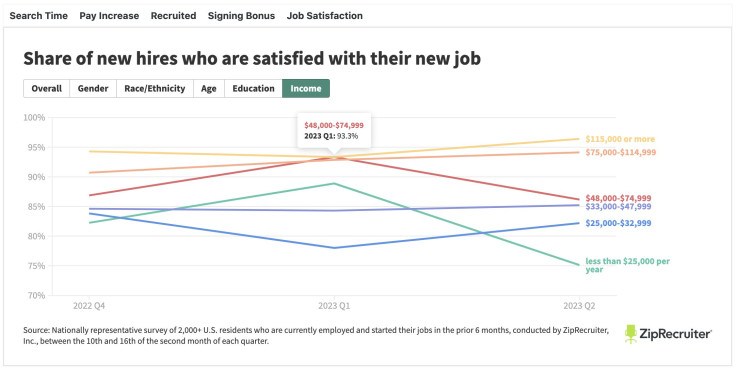
Looking for a salary increase? Returning to the office might help. The job search platform ZipRecruiter shows employers often grant higher salaries to remote workers transitioning back to in-office work.
The COVID-19 lockdowns spurred a dramatic shift towards remote work. However, new data from ZipRecruiter suggests that fully returning to the office could lead to increased earnings. According to ZipRecruiter's salary data, full-time office workers earned an average of $82,037 in March, a significant increase of over 38 percent compared to the previous year.
On the other hand, remote workers saw a more modest salary increase of 9 percent, earning an average of $75,327. According to the job platform's analysis, hybrid employees, working both in-office and remotely, experienced an 11 percent salary growth, reaching an average of $59,992.
In data shared with USA TODAY, Julia Pollak, chief economist at ZipRecruiter, said: "The recruitment and retention benefits of remote work have translated into lower wage growth pressure for remote employers, but lingering staffing challenges and wage growth pressures in in-person occupations."
Salary Comparison: In-Office Jobs Vs Remote Jobs
Recent ZipRecruiter surveys of 6,000 workers indicate that fully remote employees hired within the past six months earned an average of $60,234. In comparison, hybrid workers made $54,532 annually, while those in fully in-person roles earned $53,616.
However, Pollak noted that some remote positions, particularly those in knowledge-based fields that involve computer work, tend to offer higher salaries. According to data provided to USA TODAY, these roles are more adaptable to remote work than occupations like caregiving or cashiering.

Lincoln County, Kansas, offers new residents a compelling incentive package, including a $4,500 cash bonus, a $500 internet subsidy, a complimentary gym membership, and regular farm-fresh egg deliveries to bolster its population, attract remote workers, and stimulate economic growth.
In contrast, some employers are sparing no effort to make in-office work more appealing. These efforts come at a time when small shop owners in England are raising strong objections to Labour's ambitious workers' rights plans, fearing they might lose up to 60% of their customers.
Sir Keir Starmer is facing criticism for his proposed legislation, which aims to make flexible working the default for all employees from their first day, except when it is not reasonably feasible. Interestingly, a study by ZipRecruiter found that new hires in in-office jobs received more significant pay increases during the fourth quarter of 2023.
In-Person Workers
- Moving to a new in-person job: 23.2 percent average pay increase
- Switching to a fully-remote job: 15.8 percent average pay increase
Fully-Remote Workers
- Moving to a new, fully in-person job: 29.2 percent average pay increase
- Moving to another fully remote job: 22.1 percent average pay increase
These findings imply that "within occupations, workers are requiring higher pay increases to take fully in-person jobs than fully remote jobs," Pollak said. Employers who cannot compete on flexibility will have to compete more aggressively on pay," Pollak told BBC.com, which first reported on the in-office wage data.
Benefits Of Remote Work
Remote work offers several advantages for employees. There are 22 million (14 percent) employed US adults who work from home all the time, according to the Pew Research Center:
1) Increased Productivity
Studies show that remote work can increase employees' productivity. A June 2023 survey by Owl Labs found that nearly all (91 percent) of the 2,000 full-time US workers surveyed reported being as productive or more productive when working remotely.
Additionally, a 2020 study by Upwork found that one-third of hiring managers believe productivity has increased due to remote work settings.
2) Reduced Stress
Remote work can contribute to lower stress levels. An Owl Labs survey found that fewer remote workers (36%) reported increased work stress compared to full-time office workers (59 percent) and hybrid workers (55 percent).
3) Financial Benefits
Remote work can lead to significant financial savings. FlexJobs says remote workers can save approximately $6,000 annually by working from home. This substantial saving is likely a factor in why job seekers are willing to accept a pay cut of around 14 percent in exchange for remote work opportunities, as research from ZipRecruiter indicates.
As the world of work continues to evolve, the allure of remote work grows stronger. With increased productivity, reduced stress, and substantial financial benefits, remote work offers a compelling package for employees.







